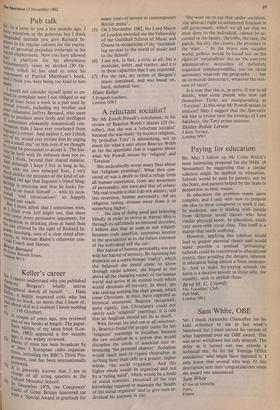A reluctant socialist?
Sir: Mr Enoch Powell's conclusion, in his review of Beatrice Webb's diaries (23 Oc- tober), that she was a `reluctant socialist' because she was really `by instinct religious, by prejudice Tory' is astonishing, not so much for what it says about Beatrice Webb as for the questions that it suggests about what Mr Powell means by `religion' and `Toryism'. She undoubtedly wrote many lines about her `religious yearnings'. What they con- sisted of was a desire to find a refuge from all human experience, from any awareness of personality, her own and that of others: `My real trouble is that I do not admire, still less reverence, human personality. All my religious feeling streams away from it to something higher.' ` ...the idea of doing good and believing blindly in order to arrive at eternal bliss is through its selfishness an immoral doctrine; I believe also that as soon as our religion becomes truly unselfish, enormous interest in the speculation as to the future existence of the individual will die out.'
Her hatred of human personality was one with her hatred of mystery. By fastening her attention on a supra-human 'reality', which she believed she could come to know through social science, she hoped to rise above all the changing variety of the human world and arrive at an eternal truth which would eliminate all mystery. In short, she was seeking nothing less than gnosis, which some Christians, at least, have regarded as heretical enterprise. Beatrice recognised, quite rightly, that Christianity could not satisfy such 'religious' yearnings. It is odd that an Anglican should not do as much.
With fervept joy and not at all reluctant- ly, Beatrice found the proper outlet for her `religious' yearnings in socialism because she saw socialism as a system that would discipline the whole of mankind into re- nouncing 'the personal element'. Socialism would teach men to regard themselves as nothing more than cells in a greater, higher whole, 'the social organism'. And this higher whole would be organised and run by a 'ruling mind', which would be a body of social scientists, possessed of the true knowledge required to maintain the 'health of the social organism' and to give each in- dividual his purpose in life. She went on to say that under socialism, `the abstract right to unfettered freedom in self-government, which we all see that we must deny to the individual, cannot be ac- corded to the family, the tribe, the race, the parish, the city, the county, the province or the state...' In the brave new socialist world, politics would be based not on the rights of 'nationalities' but on 'the concrete administrative necessities of definitely organised commonwealths; not on racial autonomy whatever the geography ... but on territorial democracy, whatever the mix- ture of races'.
It is true that this is, in spirit, if not in all details, what some people who now call themselves Tories are masquerading as `Toryism'. Is this what Mr Powell means to endorse? May I suggest that the Spectator ask him to review next the writings of Lord Salisbury, the Tory prime minister.
Shirley Robin Let win
3 Kent Terrace, London NW!














































 Previous page
Previous page